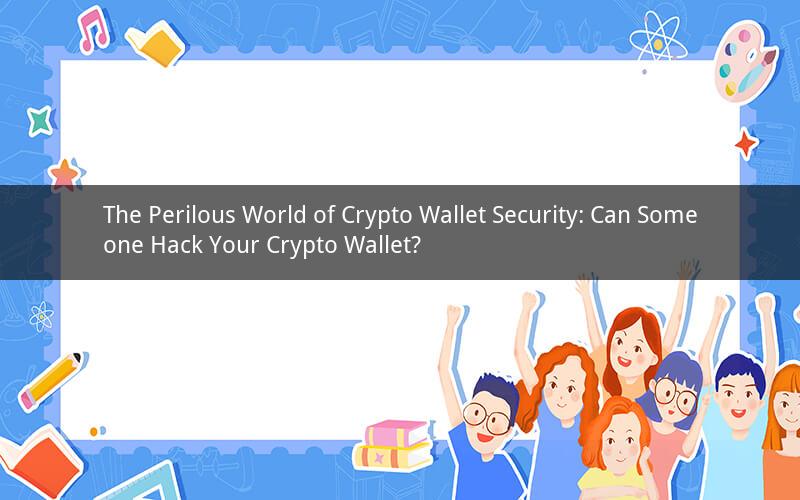
In the digital age, cryptocurrencies have become a popular investment option. With the rise of digital currencies, crypto wallets have become an essential tool for storing and managing digital assets. However, the question of whether someone can hack your crypto wallet remains a significant concern for many users. This article delves into the world of crypto wallet security, exploring the potential risks and offering insights into how you can protect your digital assets.
Understanding Crypto Wallets
Before delving into the security risks, it's crucial to understand what a crypto wallet is. A crypto wallet is a digital tool that allows users to store, send, and receive cryptocurrencies. Unlike traditional bank accounts, crypto wallets do not require a bank or financial institution to facilitate transactions. Instead, they operate on a decentralized network, such as the blockchain.
There are two main types of crypto wallets: hot wallets and cold wallets. Hot wallets are connected to the internet and offer convenience, but they are more susceptible to hacking. Cold wallets, on the other hand, are offline and considered more secure, but they may be less user-friendly.
The Risks of Hacking a Crypto Wallet
Several factors can make a crypto wallet vulnerable to hacking. Here are some of the most common risks:
1. Weak Passwords: One of the most common reasons for a crypto wallet hack is a weak password. Users should use strong, unique passwords that are difficult to guess.
2. Phishing Attacks: Cybercriminals often use phishing attacks to steal private keys or login credentials. Be cautious of unsolicited emails or messages that ask for your personal information.
3. Malware: Malware can infect your computer or mobile device, allowing hackers to gain access to your crypto wallet. Use reputable antivirus software to protect your devices.
4. Social Engineering: Cybercriminals may use social engineering tactics to manipulate users into revealing their private keys or login credentials. Be wary of unsolicited requests for sensitive information.
5. Smart Contract Vulnerabilities: Smart contracts are self-executing contracts with the terms of the agreement directly written into code. Vulnerabilities in smart contracts can be exploited by hackers to steal cryptocurrencies.
Protecting Your Crypto Wallet
To protect your crypto wallet from hacking, follow these best practices:
1. Use Strong Passwords: Create a strong, unique password for your crypto wallet. Avoid using common words or phrases, and consider using a password manager to store your credentials securely.
2. Enable Two-Factor Authentication (2FA): 2FA adds an extra layer of security by requiring a second form of verification, such as a text message or authentication app, in addition to your password.
3. Keep Your Wallet Updated: Regularly update your crypto wallet software to ensure that you have the latest security patches and features.
4. Be Cautious of Phishing Attacks: Never click on suspicious links or provide your private keys or login credentials to anyone. Always verify the legitimacy of emails or messages before taking any action.
5. Use a Cold Wallet: If you have a large amount of cryptocurrency, consider using a cold wallet to store your assets offline. This will reduce the risk of hacking, but it may be less convenient.
6. Be Wary of Smart Contract Vulnerabilities: Before interacting with a smart contract, thoroughly research its code and reputation. Use reputable platforms and wallets to ensure that your assets are secure.
Frequently Asked Questions
1. Can someone hack a hardware wallet?
Answer: While hardware wallets are generally considered more secure than software wallets, they are not entirely immune to hacking. Ensure that you follow best practices, such as keeping your device updated and storing it in a secure location.
2. How can I tell if my crypto wallet has been hacked?
Answer: Signs of a hacked crypto wallet include unauthorized transactions, a missing private key, or a compromised password. Monitor your wallet regularly and report any suspicious activity to the wallet provider.
3. Can a crypto wallet be hacked through a mobile device?
Answer: Yes, a crypto wallet can be hacked through a mobile device if it is infected with malware or if the user falls victim to a phishing attack. Use reputable antivirus software and be cautious of unsolicited messages.
4. Are there any reputable crypto wallet providers?
Answer: Yes, there are several reputable crypto wallet providers, such as Ledger, Trezor, and MetaMask. Research each provider's security features, reputation, and customer reviews before choosing a wallet.
5. Can a crypto wallet be hacked by a government agency?
Answer: While it is theoretically possible for a government agency to hack a crypto wallet, it is unlikely due to the strong encryption and decentralized nature of the blockchain. However, it's always wise to keep your private keys secure and use best practices to protect your digital assets.
In conclusion, the question of whether someone can hack your crypto wallet is a valid concern. By understanding the risks and implementing best practices, you can help ensure the security of your digital assets. Stay vigilant, keep your wallet updated, and use reputable providers to protect your cryptocurrencies from potential hackers.